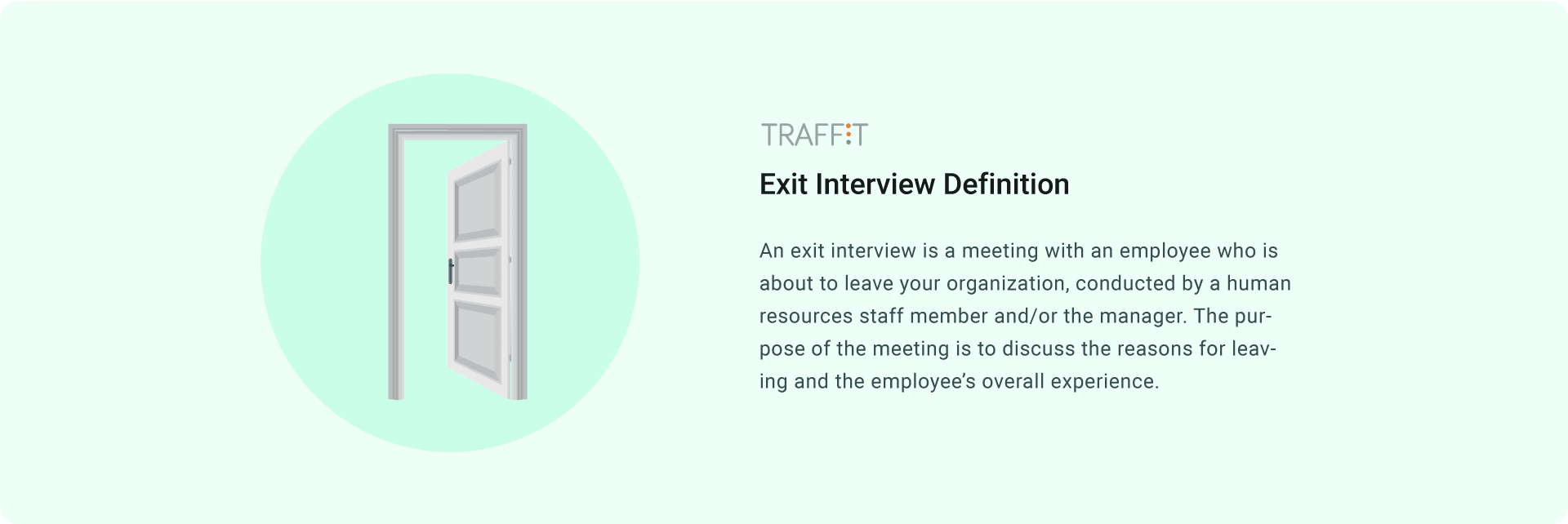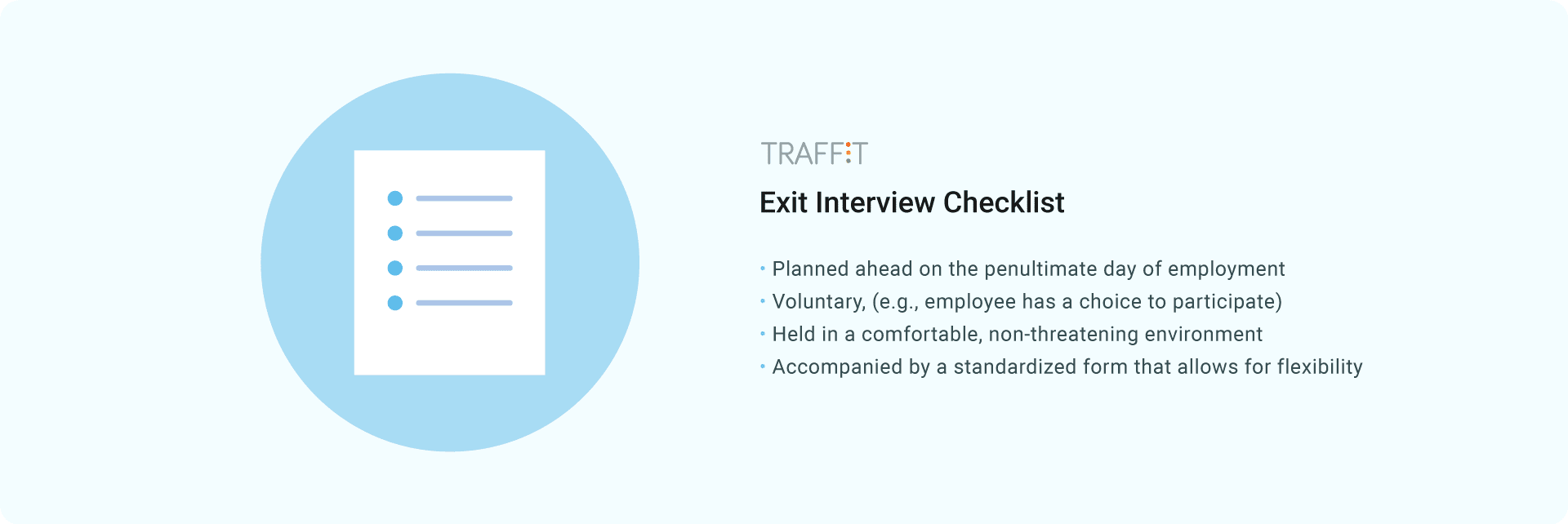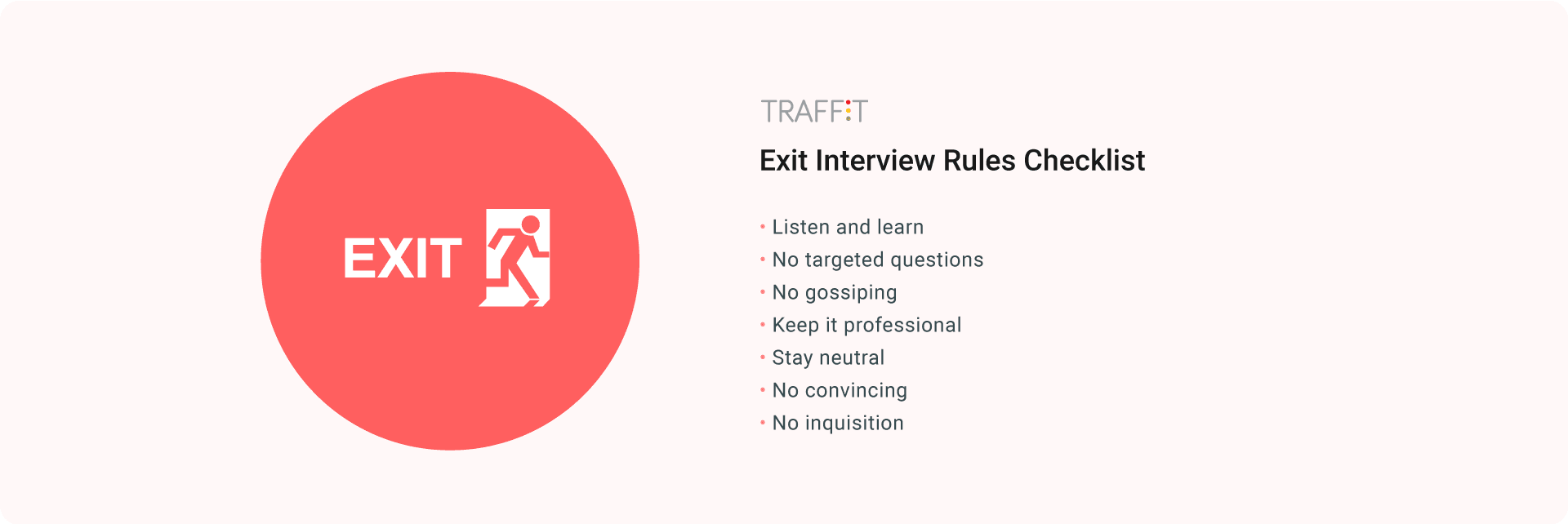Part of a pleasant offboarding experience is to give the departing employee a chance to discuss the motives behind their decision and to share their experiences at the company.
An exit interview accomplishes both of these things while allowing you to gain valuable information that will help you to lower the chances of other employees at your company handing in their notices as well.
In this article, we’re discussing in detail how to prepare and go through the exit interview.
What Is an Exit Interview?
Let’s start with a breakdown of the exit interview definition:
An exit interview is a meeting with an employee who is about to leave your organization, conducted by a human resources staff member and/or the manager. The purpose of the meeting is to discuss the reasons for leaving and the employee’s overall experience. In some cases, a third-party can be involved to represent the company in order to make sure that employees feel more comfortable discussing their experiences.

Exit interviews give you an opportunity to learn about the real motives of your departing employee, as well as to learn about the things that did and didn’t satisfy them while working for your company. This is the last chance the employee has to have a deep, conversational interaction with your company. The interview should be planned at the very end of their time with your company. Ideally, it will fall on the day before their final day of employment.
Bear in mind that exit interviews are voluntary, so employees can choose not to attend them. However, they typically do — unless they have had a terrible experience with your company and they believe that their negative feedback would not be of use to you.
Taking Care of the Setting for an Exit Interview
The key to setting up a productive exit interview is to make sure that the departing employee is comfortable when providing honest feedback. They don’t want to burn bridges and leave a bad impression behind as a consequence of speaking openly about the negative side of working at your company. You have to make sure that they are not afraid of any repercussions and that the insights they share with you are kept confidential.
You also want to ensure that management is presented with the feedback in an aggregated format, (making sure that the feedback remains nameless). As long as you stick to these rules, it is OK to take notes during the interview. For that purpose, it is a good idea to use a standardized exit interview form.
Why Is the Exit Interview Important?
If there is trust between the employer and the departing employee, you can expect both positive and negative feedback. You will learn what the great things about your organization are and what your employees appreciate the most. However, you will also learn where your weak points are and discover the areas where your company is doing poorly.
The negative feedback can be hard to take, but if your soon-to-be ex-employees are willing to share their true thoughts with you on the overall experience at your company, they are an invaluable resource. The knowledge gained from the interview can prove useful for improving how your organization works and how you treat your employees.
You will also be able to determine if there are any shortcomings with the position itself that need to be resolved before bringing in a replacement. As a result, an exit interview can help you increase one of your key performance indicators (KPI): employee retention.
Example Exit Interview
During an exit interview, you can ask for a variety of things, ranging from the employee’s daily frustrations and opinions of management to his or her thoughts on the work environment, benefits, and overall job satisfaction. When conducting an exit interview, try to encourage honest and more in-depth answers. Whatever the circumstances surrounding your employee’s decision about leaving the company are, stay open-minded. Whenever necessary, clarify their responses with follow-up questions.
Here’s an exit interview template you can use:
- What are your immediate reasons for leaving? What made you begin looking for another job?
- What would you change about this company and its culture?
- Did you share your criticism with your superiors? If so, what was their reaction?
- What would you do to improve the situation that is causing you to leave?
- Were your work goals and responsibilities reasonable and clear to you?
- Did you have all the necessary resources to successfully do your work?
- What do you think of the way you were managed?
- Did you receive feedback from your manager and colleagues? Was it fair and constructive?
- Did you receive enough training and development opportunities?
- What benefits are missing from the company?
- What did you appreciate most about working here?
- What is the company doing right?
- Is there anything we could have done to make you want to stay?
- What are the biggest weaknesses of our company and what advice would you give to the executive team?
- What advice do you have for the next person in your position?
- Would you ever consider working here again in the future?
- Would you recommend your friends to apply for a position at this company?
- Again, the above are just some of the exit interview questions you may want to ask. You don’t have to stick to that list religiously.
Exit Interview Checklist
So, summing up all that we have discussed so far, you need to ensure that your exit interview:
- is planned ahead on the penultimate day of employment,
- is voluntary, (e.g., an employee has a choice to participate),
- is held in a comfortable, non-threatening environment, and
- is accompanied by a standardized form that allows for flexibility.

Exit Interview Mistakes to Avoid at All Costs
Taking in criticism from a departing employee can be difficult at times and requires some maturity and a measure of healthy distance.
So when conducting your exit interview, make sure you stick to the following rules and avoid the potential mistakes:
- Focus on listening and asking relevant questions. You are there to learn how to improve the way your company works.
- Do not ask targeted questions about specific people or issues. This is not a witch hunt.
- Avoid gossiping. Stick to the facts, not to the rumors and third party opinions.
- Keep the conversation professional and work-related.
- Refrain from agreeing or disagreeing with the employee’s point of view. You’re neither their prosecutor nor their defender.
- Don’t try to convince them to change their mind – it is way too late for that.
- Don’t try to pull information about their new job arrangements, (i.e., salary, benefits, perks, etc.).
Exit Interview Rules Checklist
Summing up all of the above, here are the exit interview rules you need to follow:
- Listen and learn
- No targeted questions
- No gossiping
- Keep it professional
- Stay neutral
- No convincing
- No inquisition

How to Deal with the Feedback
Once the exit interview is over and your employee has left the company, don’t make the mistake of not following up productively on their constructive feedback. Remember that any pain points that they have pointed out may be shared by other members of your team — and sooner or later they will leave too unless you act accordingly.
Make sure that you present the feedback received during the exit interviews to the management team in an aggregated format, keeping the exact insights of the employee confidential to avoid any negative repercussions for the ex-employee.
Also, once you’ve conducted a number of exit interviews, look for patterns in the answers you’ve received to identify possible organizational issues. For example:
- Are your job advertisements relevant? Are they attracting the right type of candidates?
- During the recruitment stage, do you offer your candidates something that your company can’t in fact deliver?
- Do you provide ongoing training and clear paths of career advancement for each employee?
- Do you listen to your employees’ feedback and perform periodical satisfaction surveys?
- Do your salaries, benefits, and perks match what your competitors are offering their employees?
- Is your organization transparent and open, facilitating open communication and encouraging a sense of community and common goals?
If you do notice a trend in the feedback you receive, suggest actions to your team that can be taken to avoid losing more employees.
Conclusion
If planned and implemented carefully, exit interviews can be a source of valuable feedback for your company. Of course, you can treat it with a measure of healthy skepticism but always look for ways of using it to the benefit of your company.
Remember that exit interviews do not have to be nerve-wracking experiences for your departing employees either. You can give them a chance to contribute to the company for the last time while at the same time giving them a sense of closure. Stay open-minded and treat your soon-to-be ex-colleagues like experts on your organization and listen to them authentically.


